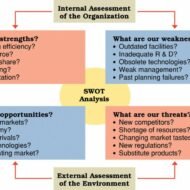Posted by Managementguru in Video Lecturers
on Apr 20th, 2014 | 0 comments

Strategic Management Video Lecture by David Kryscynski This is the introduction lecture for Strategic Management. Very Innovative and Informative video. A List of Strategic Management Terms Business – A strategy that pertains to single departments or units within a company.Combination – A type of grand strategy that employs several different grand strategies at once.Concentration – A growth strategy that extends the sale of current products or services to a company’s current market.Differentiation – A business strategy that strives to make the company’s product or service unique.Diversification – A growth strategy that moves a company into a similar kind of business with new or different products or services.Divestiture – A type of defensive strategy in which a company sells some part of its business, often an unprofitable part.Evaluating – The process of continuously monitoring the company’s progress toward its long-range goals and mission.Focus – A business strategy that directs marketing and sales towards a small segment of the market.Formal – The type of planning that involves systematic studying of an issue and the preparation of a written document to deal with the problem.Formulating strategy – Developing the grand- and business-level strategies to be used by the company.Functional – A strategy which involves short-range operational plans which support business strategies by emphasizing practical implementation.Goal – A concise statement that provides direction for employees and set standards for achieving the company’s strategic planGrand – A type of strategy that provides overall direction for the company.Growth – A type of grand strategy developed when a company tries to expand sales, products, or number of employees.Implementing – Putting a strategy to work after it has been formulated.Intermediate – Covers the time span between short-range and long-range, usually 1-3 years or 1-5 yearsLiquidation – A type of defensive strategy in which the entire company is sold or dissolved.Long Term– A three-to-five year period of time, but possibly as far as 20 years into the future.Mission Statement – A brief summary explaining why a company exists.Operational – Short-range planning that focuses on forming ideas for dealing with specific functions in the company.Overall Cost Leadership – A business strategy that is designed to produce and deliver a product or service for a lower cost than the competition.Planning – The process that businesses use to decide the company’s goals for the future and the ways to achieve those goals.Policy – A broad general guide to action that establishes boundaries within which employees must operate.Procedure – A detailed series of related steps of tasks written to implement a policy.Retrenchment – A type of strategy that aims to reverse negative trends in a company, such as losses in sales.Rule – A specific and definite corporate action that employees must follow.Short Term– A one-year period of time.Stability – A type of strategy that aims to keep the company operating at the same level that it has for several years.Strategic – Long-range planning done by the highest management levels in the company.Strategic Management – The application of the basic planning process at the highest levels of the company.Strategy – An outline of the basic steps management is going to take to achieve a goal.SWOT Analysis – The most utilized process for determining a company’s overall health; it involves analyzing internal strengths, internal weaknesses, external opportunities, and external threats.Turnaround – A type of defensive strategy that is used to regain success.Vertical Integration – A growth strategy that moves a company into a market it previously served either as a supplier or as a customer. Take The Test to Check Your Strategic...

Posted by Managementguru in Business Management, Decision Making, Marketing, Organisational behaviour, Principles of Management, Project Management, Strategy
on Mar 22nd, 2014 | 0 comments

What is Swot Analysis and how to do a Swot Analysis Perfectly? Strategy formulation is an integral part of management decision making as strategies come to our risk whilst there are fluctuations in the external environment. A management expert will tell you rightly that strategies are not templates constructed for a specific purpose as they are formulated based on broad policies of a particular organization and have to be in tandem with the enterprise objectives. Nevertheless a CEO will find himself in situations where he might be forced to make instantaneous strategic decisions irrespective of the nature of the problem, only considering the magnitude of the situation. SWOT AND SYNERGY EQUATIONS Significance of SWOT Analysis: The analysis subjectively evaluates the impact of internal and external factors for a business objective. Internal processes and resources are considered strengths and weaknesses (S and W, respectively). External factors affecting the business and industry are considered opportunities and threats (O and T, respectively). An evaluation of these factors develops a strategic perspective that includes the competitive landscape and current market conditions. Need for Alternate Strategic Decisions: Lately we are witnessing a number of multinational giants going in for Joint Ventures and Collaboration. What is the root cause for such alternate strategic decisions? What happened to the value of the “Brand Image” of the organization or the “Profit Margins” which kept the company going? Well, this is where we have to look into the structure of their operations and most importantly the modality formulated to reach their ultimate objectives. Definitely, there would have been a big dent somewhere in the top management notch, failing to see through the obvious. Market Research is Inevitable for Decision Making: Situations change and we even experience this in our day to day lives, where decision making becomes very difficult at times; further we push the situation to extreme limits and make it worse. Planning is the very basis of our life that facilitates smooth functioning and change for the better. In big corporates, decision making is by and large the responsibility of the top management and they pass on the instructions down the line. It is but natural that the chairman and board of directors should make all the important decisions as they are the potential capital investors. Market research is another area that deserves mention at this juncture without which business persons cannot think of kicking off trade as it will be a sheer waste of money and time. Understanding the pulse of the market and your target customers always help in shaping up the right strategies concerning New product launch Consumer Preference Price determination Product modification etc., Test marketing is one of the strategies followed by many multi national companies while they launch their new products or wish to introduce variations in their product range. THE IMPORTANCE OF DECISION-MAKING Strategies are based on organizational policies and policies have to confer to the objectives and goals of the organization. The top management team should be a set of professional experts who should be able to gauge the existing as well as future trends of the market based on political, legal, environmental and economic changes and sketch their action plans accordingly. Decentralising decision making and delegating the authority as and when needed are also fine strategies to gain co-operation from your employees and to bring co-ordination in the entire business...





